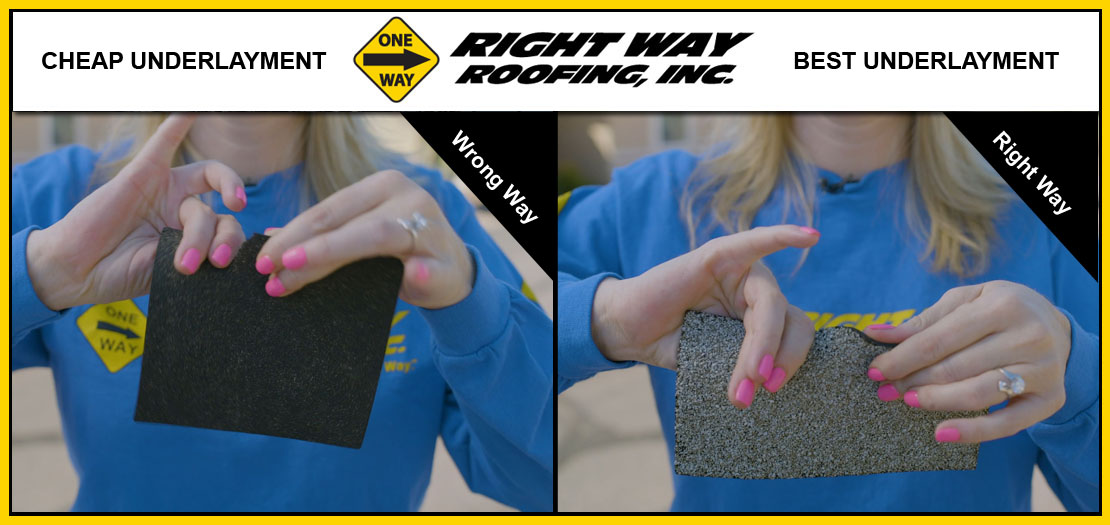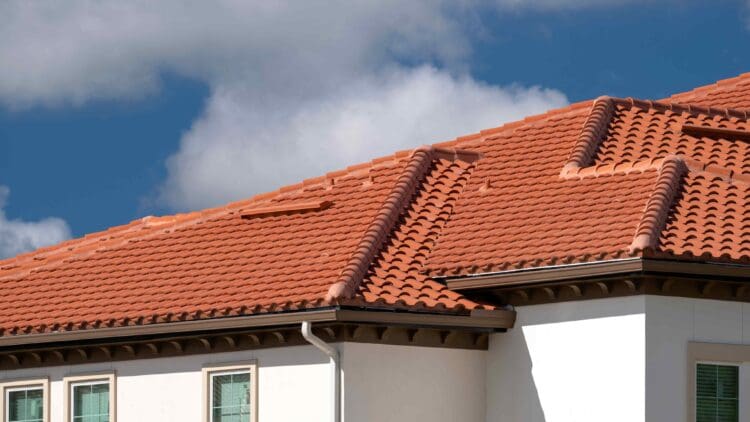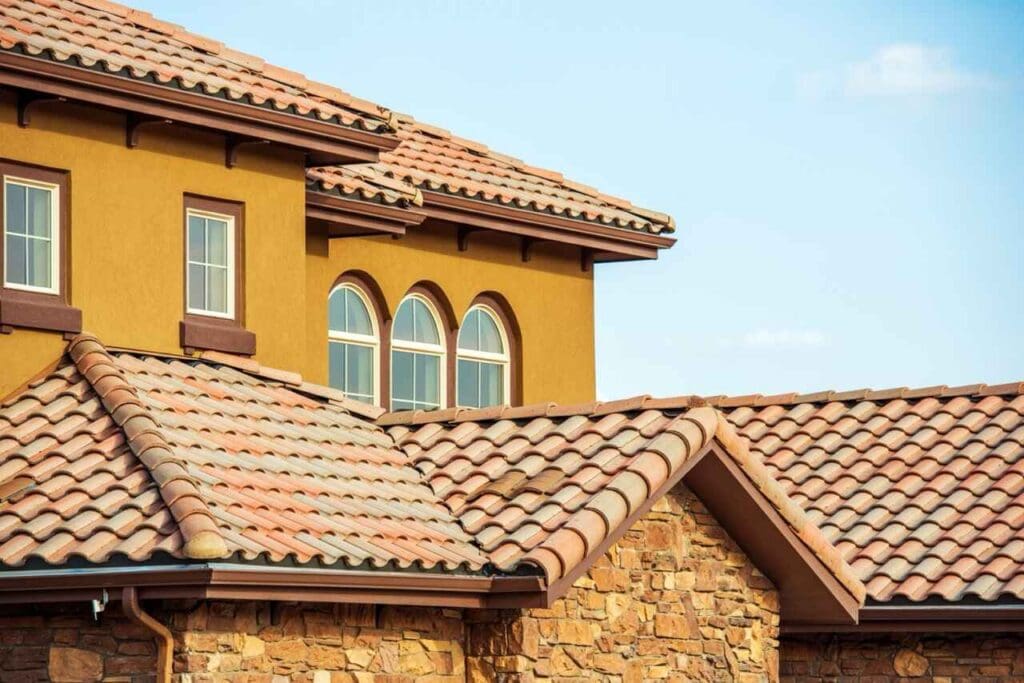If you want the best protection for your home, it’s important to choose high-quality roofing materials. This ensures optimal protection from the sun, rain, and storms.
To help you choose the best tile roof underlayment for your property, we have created a guide of helpful tips. Our comprehensive outline also discusses the unique applications of each type of roof underlayment.
What is Roofing Underlayment?
Underlayment is the foundation for roofing. It helps protect your home or commercial property from the negative consequences of water damage.
Top Types of Roofing Underlayment
Roofing Felt Underlayment
For years roofers have been using felt paper as a type of underlayment whenever a roof is being replaced. Felt has been a time-proven and even approved option for many residential roofing systems. However, does this mean felt underlayment is the always best choice?
To answer this question, we have to understand just what types of options are out there for underlayment and the value that is provided.
Roofing felt is a type of felt paper that gets soaked in asphalt and other types of water-resistant mixtures that are able to produce a membrane. This is a bit more technical, but that is the basic idea about how it works. Roofing felt is often sold in either 30# or 15# rolls that are about 36 inches wide. In the past, the 15# roll was actually 15 pounds, but as time went by it has changed.
Felt Underlayment with Asphalt Saturation
The 30-pound and 50-pound thickness levels of asphalt felt underlayment are available, with the 30-pound offering more damage resistance and roof protection than the 50-pound level. The asphalt felt underlayment is waterproof and semi-permeable, made from a blend of polyester, asphalt, bitumen, and cellulose. It is a cost-effective solution.
Rolled Roofing Underlayment
For the longest-lasting roofs instead of using standard underlayment rolled roofing can be applied. This type of underlayment is the best option for increasing the durability and lifespan of your roof.
This is by far the best roofing underlayment option. It can be installed directly on the decking before virtually any type of standard roofing from clay tiles to architectural shingles.
Peel and Stick Underlayment
Yes, you should if you can afford it. This fiberglass-based underlay is strong and long-lasting, and it can seal even when prickled by sharp-mouthed things like nails.
The peel and stick underlay is the finest choice if you require a puncture-resistant underlay that will provide the best defense against storms and winds that frequently rip off your roof shingles.
Reasons for Underlayment
In order to decide what type of underlayment is going to be best, you have to understand what underlayment is used for, what it can do, and what it is not able to do:
- Temporary protection if there is storm damage
- Vapor protection
- Protection from resins in the decking which can damage asphalt shingles
- Water-resistant, but not waterproof
Not all roofs will need to have the best underlayment on the market, and not all budgets can afford it. Standard shingles do not need the same type of vapor protection that could be needed for slate or metal roofs.
A very common misconception by a homeowner is that underlayment is waterproof and that their roof can leak if it isn’t there. Even though the underlayment is water-resistant, it is not self-sealing, so water can get into every single hole that a nail has made. So, what underlayment is going to be best for your project?
If you happen to be on a tight budget, then 15# roofing felt may be the right choice. Felt has been used for years and has a great track record.
Is there an even better option than felt? Yes, but felt is still a really good choice. Also, felt has a really good fire rating and is very slow to burn.

We proudly offer the longest-lasting tile roof repair services as we use the highest quality underlayment for tile roofs in Arizona. The underlayment is what really protects your roof in the tile roofing system, not the tiles themselves. The underlayment we use far exceeds the competition and can be used as a stand-alone roofing system. This is why our repairs last longer than the competition and offer every one of our valued customers the biggest bang for their buck!
Average Cost To Replace Tile Roof Underlayment
Tile underlayment replacement costs about $436 per square across the US.
$436 x 24 squares = $10,464 average cost to replace tile underlayment
*These are not an actual estimate for your project, to get a free estimate, contact the professionals from Right Way Roofing.
If your tile is still in good condition, we can still use it. We simply remove your current roofing tiles, replace the underlayment and put the same tiles back in place. This costs much less than replacing your entire roofing system. The average cost of removing and replacing roofing tile is about $300-$325 per sq in Arizona, depending on the roofing contractor you choose.
How Often Should I Replace Tile Underlayment?
The tiles on your roof will probably never wear out, however, the material the tiles rest on is susceptible to wearing out every 8-20 years and is difficult to reapply.
Other tile roofing companies use a cheap underlayment that rips and tears easily leaving you prone to roof leaks. Our tile underlayment is much better and can’t even be torn by the average person. Our underlayment is much more durable, will prevent leaks, and can last up to 40 years. We offer a 30-year warranty on our tile underlayment!
If you don’t keep up with this process your roof will develop leaks and cracked tiles due to warping. The process of replacing the underlying layers involves hiring a roofing professional to come in and strip the tiles off of the material that needs to be replaced. A professional will then reapply the needed material and place the tiles back over the fresh material.
What Should I Take into Account When Selecting Underlayment for a Tile Roof?
Now that you are familiar with the process of choosing the best tile roof underlayment, lets talk about the main factors to consider when choosing a type. The most common variables to consider include the climate, the type of primary roof, and local legislation.
Regional Climate
The climate and changes in latitude that are prominent in and unique to your region and state. For areas with a moderate climate, a different roof underlayment is used than for those in hot, cold, dry, or humid climates.
Material Durability and Quality
It’s important to remember that the best underlayment for tile roofing must be extremely strong and long-lasting. That is, it must be tough and durable enough to withstand the elements while also supporting the weight of the tiles.
Is Roof Underlayment Required?
Roof underlay, according to some, isn’t required if your roof has a low slope. But, just as your body’s cell membranes serve as a barrier to protect cell components while allowing access to essential nutrients, your roof underlayment does the same.
It is a waterproof layer and barrier that protects your tile roof from water intrusion. It is applied to the deck or plywood right before the shingles are installed. You can provide roof underlay regardless of whether your roof is low-slope or high-water-risk.
Tile Roof Underlayment Replacement and Installation Services in Arizona
Our professionals not only install the best underlayment and roofing in the industry, but we repair old roofing too. Whether you need a spot repair for missing tiles or a whole roof replacement, the professionals from our local Phoenix roofing company are available to help.
Don’t wait until your roof leaks during a storm and risk the condition of the interior of your home. Have yearly roof inspections and invest in the care of your home’s roofing to protect your property and it’s value! For more information about how to get the best roof repair in Phoenix please call 480-232-5458.
Why Do Homeowners Choose to Work With Our Team?
Most tile roofs leak when the layer under the tile is worn out or damaged. This layer is called the tile underlayment and is the primary water-repelling layer that protects your home. In a lot of cases, the tiles simply need to be moved and a new layer of underlayment installed.
If you need assistance fixing your damaged underlayment or want to invest in a new tile roof, contact our staff to receive assistance. Our professionals offer superior roofing replacement services in Phoenix and utilize the longest-lasting underlayment which is strong enough to be a standalone roofing product. Our team will work with you to prevent roof leaks and water damage in your house.
RIGHT WAY ROOFING IS A RESIDENTIAL AND COMMERCIAL ROOFING CONTRACTOR LOCATED IN PHOENIX ARIZONA


